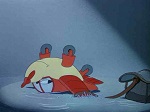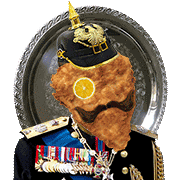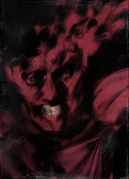|
Yaoi Gagarin posted:I've been reading Japan 1941 by Eri Hotta. It covers the political situation that led to war with the US. I'm not qualified to say how accurate it is, but it's a good read Kangxi posted:I also second Japan 1941 by Eri Hotta as that is a diplomacy/high politics look at the years preceding the Pacific War. third. its very good and explains alot of the high level choices that were made, kinda shows how it was mostly the reactionary imperial version of robbing peter to pay paul. Japan got stuck in china and could either call it quits OR start more wars to get resourses to keep invading china.
|
|
|
|

|
| # ? Apr 16, 2024 23:23 |
|
Has anyone read The Anglo-Saxons: A History of England 400 - 1066? Seems to have good reviews but curious what goons think of it.
|
|
|
|
Iím reading Battle Cry of Freedom about the US Civil War and itís pretty great. Never knew southerners were trying to invade Cuba, and successfully took over Nicaragua (!) for a short time. Wild! blue squares fucked around with this message at 00:19 on Mar 29, 2024 |
|
|
|
blue squares posted:Iím reading Battle Cry of Freedom about the US Civil War and itís pretty great. Never knew southerners were trying to invade Cuba, and successfully took over Nicaragua (!) for a short time. Wild! Learning about the filibuster campaigns in college was one of the big "wow, there's till a lot of history to learn" moments for me when I was in college. It's a bit of a minefield of a subject though. Much like the Civil War, you get a lot of authors that are oddly sympathetic to the slavers. I remember reading a Cato Institute article celebrating William Walker back in the late oughts. I'd be interested in an account of those campaigns from a non-American perspective. Tycoon's War seemed to relish Walker as a character too much for my liking. Ed Harris did star in a hilarious movie about him (filmed during the Contra War). The whole thing is basically a practical joke with obvious and intentional anachronisms and nods to contemporary politics, but Harris actually portrays Walker pretty well. I remember there being a scene where Reagan sends in a helicopter to bring Walker back to the states right in the middle of a 19th Century battlefield like the end of Monty Python and the Holy Grail. Need to watch it again. https://youtu.be/Nn45GsPoZrc
|
|
|
|
Mustang posted:Has anyone read The Anglo-Saxons: A History of England 400 - 1066? I read it at the end of last year and thought it was pretty good. Mostly focused on the various Kings and it did a pretty good job helping keep all the various names straight even though they can be quite similar. I particularly enjoyed the early bits about the effect of Rome's withdrawal and the Christianisation and the all-important timing of Easter.
|
|
|
|
Whenever I start reading a new history book, itís so hard to stay focused just on it. I have a Kindle, so every time my book touches on a subject I am curious about, itís easy to download a sample of another book that covers that subject. And so on Sometimes I think it would be enjoyable to pick a starting period and try to read chronologically from there, continuously adding books to the list as I learn. But I would a) probably make very little progress forward and b) eventually get sick of the depth in one era and want to leap forward
|
|
|
|
Anyone have any recommendations for books covering the US Navy during WW2?
|
|
|
|
BitAstronaut posted:Anyone have any recommendations for books covering the US Navy during WW2? All of Hornfischer's books are good. Off the top of my head the big ones of his you should pick up are Neptune's Inferno (Guadalcanal / Solomons campaign, aka the dodgy middle part of the war) The Fleet at Flood Tide (USN 1944-45, back half of the war when it's just a loving juggernaut), and Last Stand of the Tin Can Sailors which is a one off about one of the more  naval battles in the war. naval battles in the war.
|
|
|
|
BitAstronaut posted:Anyone have any recommendations for books covering the US Navy during WW2? I went through the audio book of Toll's trilogy (Pacific Crucible: War at Sea in the Pacific, 1941–1942, The Conquering Tide: War in the Pacific Islands, 1942–1944, Twilight of the Gods: War in the Western Pacific, 1944-1945 and found them to be a good bunch. Edit: Almost forgot, if you haven't yet, Shattered Sword: The Untold Story of the Battle of Midway is very, very good, imo. GoingPostal fucked around with this message at 16:55 on Mar 30, 2024 |
|
|
|
This may not be strictly historical but are there any books about how armies of particular periods fought wars and battles? Like, how does a nation pre-railroad mobilise its forces, get their troops to the field and get them back. How did a general issue movement and attack orders before telephones? How did it change when telephones came along? How do you actually use a tank, or artillery on the battlefield? Closely related, can anyone recommend books on how ships and navies answered similar questions?
|
|
|
|
I've been listening to Christopher Clark's new book on the revolutions of 1848, Revolutionary Spring and so far it's been great. I've enjoyed his other books and think he is generally well-regarded but I don't have a ton of knowledge about the revolutions to compare to (hence why I am reading the book)
|
|
|
|
About halfway through Mary Beards SPQR and it'd pretty good although nothing ground breaking.
|
|
|
|
GoingPostal posted:I went through the audio book of Toll's trilogy (Pacific Crucible: War at Sea in the Pacific, 1941Ė1942,† Hornfischer and Tollís books are all very good. Damned shame Hornfischer died so young.
|
|
|
|
GoingPostal posted:I went through the audio book of Toll's trilogy (Pacific Crucible: War at Sea in the Pacific, 1941–1942, I read both shattered sword and the twilight of the gods and man were they heavy
|
|
|
|
Lawman 0 posted:I read both shattered sword and the twilight of the gods and man were they heavy I just read Shattered Sword and loved it.
|
|
|
|
Railing Kill posted:I just read Shattered Sword and loved it. It's really full of incredible details.
|
|
|
|
It's not US Navy exactly, but Destroyer captain by Hara is pretty great read
|
|
|
|
Just finished Black AF History: The Un-Whitewashed Story of America by journalist Michael Harriot, and it was pretty good. Writing tries a bit hard to be funny at times, but there's a lot of great info in there, and the author is generally a pro-Twitter follow on race issues.
|
|
|
|
BitAstronaut posted:Anyone have any recommendations for books covering the US Navy during WW2?
|
|
|
|
branedotorg posted:i read it recently, it's well written but it's far more a history of christianity in the eastern empire than a history of the empire itself. entire wars are given paragraphs at most but every minor conclave is give multiple pages or more. I'm reading this too but only about a quarter of the way though. I'm all about the church poo poo so it's still right up my alley but it's still odd. At one point the author mentions how a battle is the best documented of the period but doesn't do anything more than mentioning that and who won. Even for a political/religious history I'd have expected a bit more attention to the military history side of things.
|
|
|
|
Mr_Roke posted:I'm reading this too but only about a quarter of the way though. Kaldellis is a church/religious historian by background, so its not surprising that the focus of the book is a little bit slanted. Most of the time that is the case for huge, synthetic history books like that one, no one is a specialist in everything, but every historian is a specialist in something, and when they write about broad topics they generally bring their own area of specialty in more than someone else might.
|
|
|
|
CrypticFox posted:Kaldellis is a church/religious historian by background, so its not surprising that the focus of the book is a little bit slanted. Most of the time that is the case for huge, synthetic history books like that one, no one is a specialist in everything, but every historian is a specialist in something, and when they write about broad topics they generally bring their own area of specialty in more than someone else might. sure, it's very well written, just the title and blurb are very misleading and if i'm honest i wouldn't have spent $40 on a primarily religious history text. "the publisher' posted:A major new history of the eastern Roman Empire, from Constantine to 1453. In recent decades, the study of the Eastern Roman Empire, also known as Byzantium, has been revolutionized by new approaches and more sophisticated models for how its society and state operated. No longer looked upon as a pale facsimile of classical Rome, Byzantium is now considered a vigorous state of its own, inheritor of many of Rome's features, and a vital node in the first truly globalized world. The New Roman Empire is the first full, single-author history of the eastern Roman empire to appear in over a generation. Covering political and military history as well as all the major changes in religion, society, demography, and economy, Anthony Kaldellis's volume is divided into ten chronological sections which begin with the foundation of Constantinople in 324 AD and end with the fall of the empire to the Ottoman Turks in the fifteenth century. The book incorporates new findings, explains recent interpretive models, and presents well-known historical characters and events in a new light."
|
|
|
|
zedar posted:Can anyone recommend a good book on the Empire of Japan, with a focus on Japanese expansionism in the lead up to and during the pacific war? Preferably not too focused on the military aspect so much as the politics and international consequences. This thread on twitter might be of interest: https://twitter.com/mattyglesias/status/1779690553250128061 Most of the books were covered in this thread like 1941 and herbert bix's biography of hirohito, but there are some other picks as well.
|
|
|
|

|
| # ? Apr 16, 2024 23:23 |
|
smr posted:Hornfischer and Tollís books are all very good. Damned shame Hornfischer died so young. Iím going to go against the usual grain of this thread and say Iím not a big fan of Hornfischer. He has a very journalistic style which doesnít always work very well, and there are a few somewhat wild and unsourced claims he throws in. One that stood out to me was a claim that the Japanese Army knew that the Navyís codes had been broken, but didnít bother to tell them. Last Stand and the one about the Houston are okay, Neptunes Inferno has a few problems but isnít bad. Fleet at Flood Tide I found very problematic, particularly around Philippine Sea and Spruanceís decision making - a complicated issue that needed more rigour. Tollís trilogy is excellent though, strikes just the right balance between historical rigour and readability. Iíd also recommend John Prados, particularly Combined Fleet Decoded and Islands of Destiny.
|
|
|





















